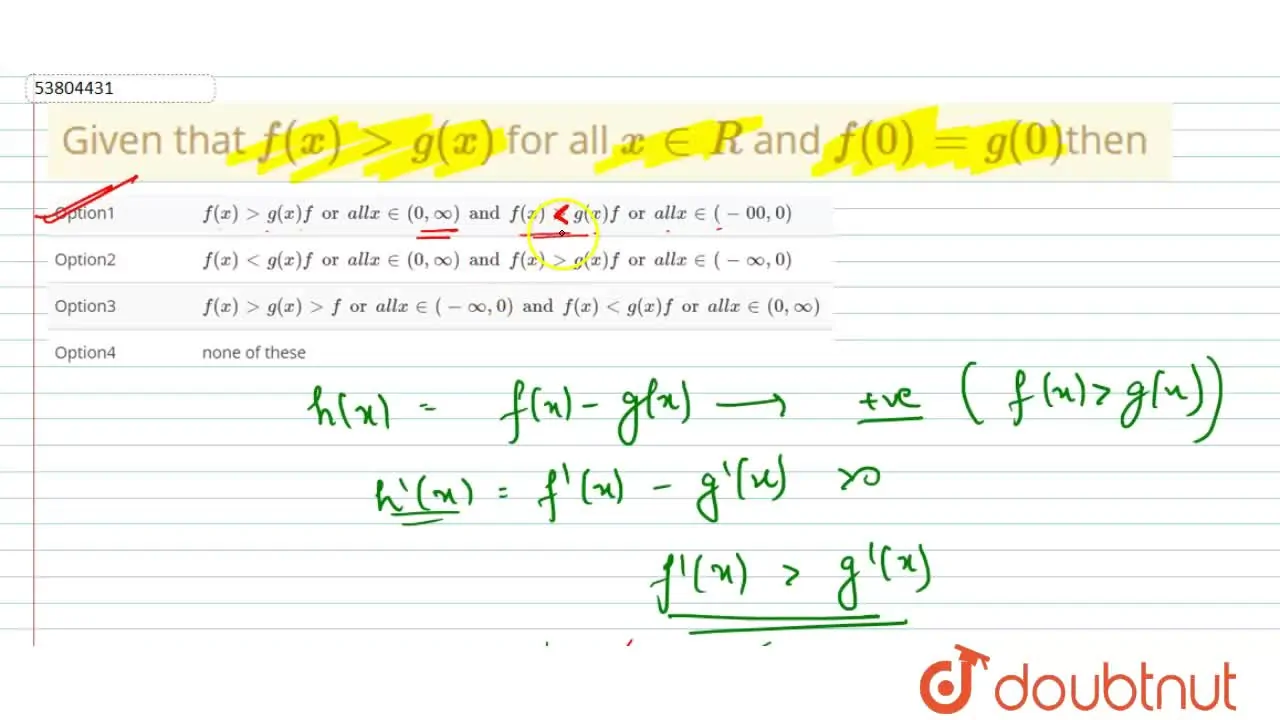Given that f(x)>g(x) for all x∈R and f(0)=g(0)then
f(x)>g(x)forallx∈(0,∞)andf(x)>g(x)forallx∈(−∞,0)
f(x)<g(x)forallx∈(0,∞)andf(x)>g(x)forallx∈(−∞,0)
f(x)>g(x)>forallx∈(−∞,0)andf(x)<g(x)forallx∈(0,∞)
none of these
The correct Answer is:A
Let h(x)=f(x)−g(x)forallx∈R Then
h(x)=f'(x)−g'(x)forallx∈R
⇒h(x)>0forallxInR
⇒f(x) is increasing on R.
But, h(0) =f(0)-g(0) =0
∴h(x)<h(0)forallx>0
⇒f(x)−g(x)>0forallx∈(−∞,0)
⇒f(x)>g(x)forallx∈(0,∞)
and
f(x)<g(x)forallx∈(−∞,0)
Related Playlists
- BOOK - OBJECTIVE RD SHARMACHAPTER - INCREASING AND DECREASING FUNCTIONSEXERCISE - Section II - Assertion Reason Type8videos
INCREASING AND DECREASING FUNCTIONS
- BOOK - OBJECTIVE RD SHARMACHAPTER - INCREASING AND DECREASING FUNCTIONSEXERCISE - Exercise36videos
INCREASING AND DECREASING FUNCTIONS
- BOOK - OBJECTIVE RD SHARMACHAPTER - INCREASING AND DECREASING FUNCTIONSEXERCISE - Chapter Test20videos
INCREASING AND DECREASING FUNCTIONS
- BOOK - OBJECTIVE RD SHARMACHAPTER - HEIGHTS AND DISTANCESEXERCISE - Exercise45videos
HEIGHTS AND DISTANCES
- BOOK - OBJECTIVE RD SHARMACHAPTER - INDEFINITE INTEGRALSEXERCISE - Chapter Test30videos
INDEFINITE INTEGRALS
Similar Questions
Given that f'(x)>g'(x) for all real x,andf(0)=g(0). Then f(x)<g(x) for all x belong to (a)(0,oo) (b) (−∞,0) (c) (−∞,∞) (d) none of these
View SolutionLet f'(x)>0andg'(x)<0 for all x∈R Then
View SolutionConsider f g and h are real-valued functions defined on R. Let f(x)−f(−x)=0 for all x∈R, g(x)+g(−x)=0 for all x∈R and h(x)+h(−x)=0forall x in R.Also,f(1)=0,f(4)=2,f(3)=6,g(1)=1,g(2)=4,g(3)=5,andh(1)=2,h(3)=5,h(6)=3Thevalueoff(g(h(1)))+g(h(f(-3)))+h(f(g(-1))) is equal to
View SolutionLet f(x)andg(x) be two function having finite nonzero third-order derivatives fxandgx for all x∈R. If f(x)g(x)=1 for all x∈R, then prove that f/f′−g/g′=3(f/f−g/g).
View SolutionIf f(x) and g(x) are two differentiable functions on R+ such that xf'(x)+g(x)=0 and xg'(x)+f(x)=0 for all x∈R+and f(1)+g(1)=4, then the value of f"(2).g"(2) is
View SolutionLe f:R→Randg:R→R be functions satisfying f(x+y)=f(x)+f(y)+f(x)f(y)andf(x)=xg(x) for all x,y∈R.Iflimx→0g(x)=1 , then which of the following statements is/are TRUE ?
View SolutionLet f(x) be a continuous function for all x∈Randf'(0)=1 then g(x)=f(|x|)=f(|X|)−√1−cos2x2,atx=0,
View SolutionLet f(x) be a quadratic expression such that f(x)<0∀x∈R . If g(x) f'(x) + f''(x) then for x∈R.
View SolutionLet f be a continuous function on R satisfying f(x+y)=f(x)+f(y) for all x,y∈R with f(1)=2andg be a function satisfying f(x)+g(x)=ex then the value of the integral ∫10f(x)g(x)dx is
View SolutionIf f(x) is a quadratic expression such that f(x)>0∀x∈R, and if g(x)=f(x)+f'(x)+f''(x), then prove that g(x)>0∀x∈R.
View Solution


